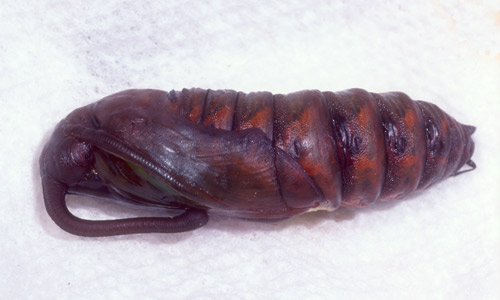organic method for hornworms?
Hello all, Well after a couple years of gardening the dreaded hornworm finally found my tomato plants. Is there a organic treatment to get rid of them? So far I have picked seven of them off my plants. Thanks all.
- rainbowgardener
- Super Green Thumb
- Posts: 25279
- Joined: Sun Feb 15, 2009 6:04 pm
- Location: TN/GA 7b
Hand picking works well, once you learn to spot them. For being so big, they are well camouflaged. Watch for their poops, the worm will be above them.
In the longer term, there is a parasitic mini-wasp (braconid wasp) that parasitizes them. The wasp is tiny and stingless; you will probably never see it. But if you ever see a hornworm looking like this:

Leave it alone. The white things are cocoons, from which the adult wasps will emerge to continue the life cycle (laying eggs inside the hornworm body). The hornworm at that point is dying.
So you want to have flowers in your garden to attract the braconids. The adults are nectar eaters and like flowers that have nectar in tiny florets. That includes all the carrot family stuff (carrots, parsley, dill, fennel, etc), and yarrow, cosmos, sweet alyssum, marigolds, tansy, pennyroyal, lemon balm, thyme, zinnias, and others.
Before I moved, I had a well established garden with lots of these flowers and I almost never saw a hornworm that wasn't parasitized.
Dig around your tomato plants in late spring, early summer. You might find one of these buried an inch or two deep:

It is the pupa of the hornworm. Left alone a large adult moth will emerge from it and lay the eggs that become the hornworms.
If you find one, destroy it (unless you like the moth which is rather beautiful)
In the longer term, there is a parasitic mini-wasp (braconid wasp) that parasitizes them. The wasp is tiny and stingless; you will probably never see it. But if you ever see a hornworm looking like this:

Leave it alone. The white things are cocoons, from which the adult wasps will emerge to continue the life cycle (laying eggs inside the hornworm body). The hornworm at that point is dying.
So you want to have flowers in your garden to attract the braconids. The adults are nectar eaters and like flowers that have nectar in tiny florets. That includes all the carrot family stuff (carrots, parsley, dill, fennel, etc), and yarrow, cosmos, sweet alyssum, marigolds, tansy, pennyroyal, lemon balm, thyme, zinnias, and others.
Before I moved, I had a well established garden with lots of these flowers and I almost never saw a hornworm that wasn't parasitized.
Dig around your tomato plants in late spring, early summer. You might find one of these buried an inch or two deep:

It is the pupa of the hornworm. Left alone a large adult moth will emerge from it and lay the eggs that become the hornworms.
If you find one, destroy it (unless you like the moth which is rather beautiful)
- applestar
- Mod
- Posts: 30540
- Joined: Thu May 01, 2008 7:21 pm
- Location: Zone 6, NJ (3/M)4/E ~ 10/M(11/B)
Do you have a big tomato garden? In my experience, hornworms are a pest but not a serious one. Although I do plant a lot of tomatoes, I have them spread out in 3-4 different areas or few plants here and there, not a whole field or jungle, and I do stake them and keep the vines separated for air circulation, so with diligent, frequent inspection I do notice missing foliage and caterpillar poop eventually. I admit I sometimes don’t find them until well -grown and couple of inches in length at times, having lost several green eaten tomatoes already, but even then, once signs are spotted, I can locate them.
In the mean time, the Garden Patrol are at work, and I cheer them on when I see cardinals and house wrens hunting among the tomatoes, and am happy to see hornworms carrying braconid wasp pupae on their backs.
I accept these natural predators at work, but I don’t use products that harm butterfly and moth caterpillars myself for the most part because my garden is a waystation for Monarch Butterflies.
So far, I have never seen braconid infested Monarch caterpillars, but tachnid flies do parasitize them, and every time I find a brown-lesion covered or blackened Monarch caterpillar dying or dead from bacterial infection, I’m concerned that they or the adult butterflies had come in contact with Bt somehow, although there are other butterfly diseases that result in similar symptoms as well.
In the mean time, the Garden Patrol are at work, and I cheer them on when I see cardinals and house wrens hunting among the tomatoes, and am happy to see hornworms carrying braconid wasp pupae on their backs.
I accept these natural predators at work, but I don’t use products that harm butterfly and moth caterpillars myself for the most part because my garden is a waystation for Monarch Butterflies.
So far, I have never seen braconid infested Monarch caterpillars, but tachnid flies do parasitize them, and every time I find a brown-lesion covered or blackened Monarch caterpillar dying or dead from bacterial infection, I’m concerned that they or the adult butterflies had come in contact with Bt somehow, although there are other butterfly diseases that result in similar symptoms as well.
